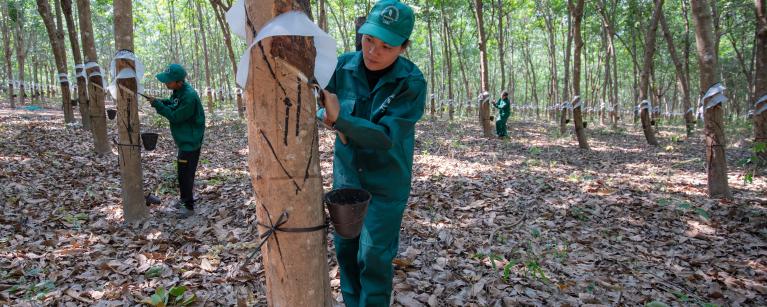Oxfam is driving transformative change in the rubber trade between Cambodia and Vietnam, focusing on empowering smallholder farmers, fostering community leadership, and advocating for sustainable practices in the natural rubber supply chain. Through collaborative efforts with government agencies, civil society organizations, private sectors, and local communities, Oxfam aims to address challenges posed by stringent new regulations like the EU Deforestation Regulation (EUDR) while promoting inclusivity and resilience.
“Oxfam’s efforts extend to supporting the mobilization of small-scale rubber producers, empowering them to negotiate fair latex prices with traders, and encouraging solidarity and knowledge sharing among farmers. By amplifying the voices of smallholder farmers and promoting their active participation in the rubber trade, Oxfam helps ensure that marginalized groups, including women, are not left behind amid evolving market conditions and environmental challenges.”
On March 27, 2025, Oxfam co-hosted a workshop in Phnom Penh titled “Promoting Sustainable Rubber Production, Trade and Investment in Cambodia and Vietnam.” This event brought together rubber companies, government agencies, NGOs, researchers, and smallholders to discuss the interconnected natural rubber supply chains between the two countries. Key discussions addressed legality, sustainability, risks, and opportunities for collaboration. The workshop underscored the importance of community-led approaches and the collective commitment required to safeguard natural resources while securing sustainable livelihoods.
Ms. Sophoan Phean, Oxfam National Director, highlighted the significance of empowering smallholders in the context of emerging regulations.
“While the implementation of EUDR is likely to drive significant change in how rubber is produced, sourced, and traded, and promote sustainability in the rubber value chain, smallholder rubber farmers risk being marginalized if they lack the capacity to adapt or access adequate support. This requires collective efforts from stakeholders from the government, private sector, and NGOs,” Sophoan said.
Through its initiatives, Oxfam is paving the way for a sustainable rubber trade that not only meets international compliance standards but also prioritizes the well-being of communities. By championing inclusivity, promoting equity, and strengthening local capacity, Oxfam’s work ensures that the rubber trade contributes to a resilient and sustainable future for both Cambodia and Vietnam.
